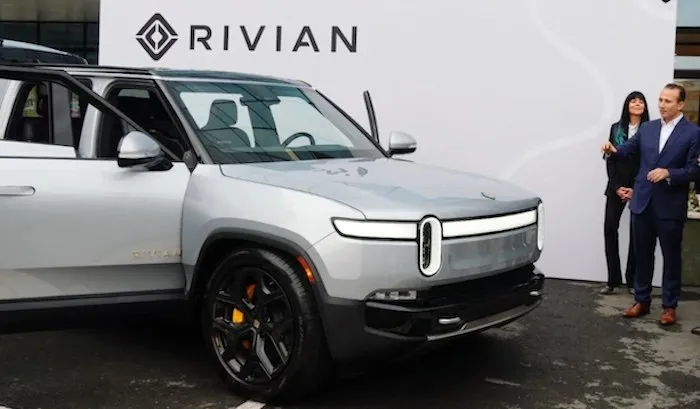
Volkswagen Group (VW) has announced a significant partnership with Tesla competitor Rivian, boosting its investment in the electric vehicle (EV) market. The joint venture, initially valued at $5 billion, has now increased to $5.8 billion, reflecting the growing importance of this collaboration. Rivian’s shares surged over 9% in after-hours trading following the announcement, signaling strong investor interest in the deal.
The partnership aims to leverage both companies’ strengths to navigate the challenges of the global EV market, which is currently facing slowing demand and intensifying competition, particularly from Chinese manufacturers. Rivian, a loss-making EV startup, stands to gain much-needed funding from the venture as it prepares to launch its new R2 model, a smaller and more affordable electric sports utility vehicle (SUV) set for release next year. The move will allow Rivian to accelerate its product development while reducing operational costs, positioning itself for growth in an increasingly competitive market.
For Volkswagen, the deal offers an opportunity to integrate Rivian’s innovative technologies into its own EV offerings, providing a technological edge that could help it stay competitive in the rapidly evolving industry. The first VW models equipped with Rivian’s technology are expected to be available as early as 2027, marking a significant step in VW’s transition to electric mobility.
The two companies aim to combine their complementary expertise, which will not only help reduce development costs but also speed up the rollout of new technologies. In their joint statement, VW and Rivian emphasized the importance of collaboration in scaling up production and enhancing the EV experience for consumers. As part of the plan, teams of software engineers and developers from both companies will initially work side by side in California, with additional facilities to be set up in North America and Europe.
The partnership comes at a time when expectations are growing that Volkswagen will soon announce a series of major cost-cutting measures. As Europe’s largest automaker, VW is grappling with rising costs, weakening sales, and fierce competition from Chinese EV makers. In addition, the company has faced challenges in its transition from internal combustion engines to electric powertrains, with the shift toward EVs occurring slower than anticipated.
VW’s portfolio includes a wide range of high-end brands such as Audi, Lamborghini, and Porsche, all of which are working toward an electric future. However, the competition in the EV market is intensifying, and the company is under pressure to improve its efficiency and accelerate the development of new models that meet consumer demand.
Rivian, too, has been taking steps to reduce costs and streamline operations in response to softening demand for electric vehicles. Despite the promise of its cutting-edge technology and strong backing from Amazon, Rivian has yet to turn a profit. To address this, the company has been renegotiating contracts with suppliers and refining its manufacturing processes to improve efficiency.
Rivian’s electric delivery vans, produced primarily for Amazon, are another key component of the company’s strategy. Amazon is Rivian’s largest shareholder and has placed a massive order for 100,000 electric delivery vans, all of which are set to be delivered by the end of the decade. This partnership with Amazon is expected to provide a steady source of revenue for Rivian, even as it faces challenges in the broader EV market.
As the partnership between Volkswagen and Rivian develops, it will be interesting to see how both companies manage to balance innovation with cost-efficiency. While VW brings its decades of automotive experience and global reach to the table, Rivian offers cutting-edge technology and a fresh approach to electric vehicle design. Together, they hope to reduce the financial burden of EV development and accelerate the delivery of innovative solutions to consumers.
In conclusion, the $5.8 billion partnership between Volkswagen and Rivian is a strategic move designed to address some of the most pressing challenges in the electric vehicle sector. Both companies stand to benefit from sharing technology and reducing development costs, positioning themselves for success in a highly competitive market. As the transition to electric vehicles continues, this collaboration could prove crucial for both automakers as they strive to stay ahead of the competition and meet the growing demand for sustainable transportation solutions.







